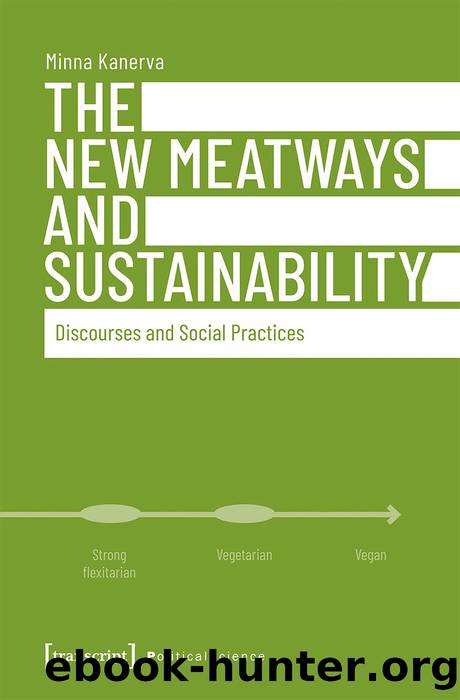The New Meatways and Sustainability: Discourses and Social Practices by Minna Kanerva

Author:Minna Kanerva [Kanerva, Minna]
Language: eng
Format: epub
Tags: Public Policy, History & Theory, Democracy, Political Ideologies, Political Science, General
ISBN: 9783839454336
Google: gtcyEAAAQBAJ
Publisher: transcript Verlag
Published: 2021-06-30T11:35:28+00:00
* * *
1I attempt to build a structure that makes sense, so to speak, and seeks to explain to a satisfactory level. In interdisciplinary work, some fences may be necessarily crossed (e.g. here, using social psychology in connection with social practice theories), and this may not always seem appropriate at first sight. However, I hope to be able to justify adequately the arguments I make. Many of the mechanisms and related phenomena to do with social practices, and human behaviour in general, are still far from being fully explained. This book is one attempt to suggest some combinations of links that may not have yet been explored fully.
2Chapter 4 will explain in more detail how I conducted the data analysis in practice.
3What is meant by the rational choice model here includes many recent theories about behaviour. One overview of them can be found at https://www.apsc.gov.au/changing-behaviour-public-policy-perspective.
4In the portfolio model (originally from Hindess, 1988), people choose their behaviour based on a portfolio consisting of more or less stable values, attitudes, norms, interests and desires (Welch, 2017).
5The âABCâ (in the way Elizabeth Shove uses it) comes from attitude, behaviour, and choice. Shove (2010) argues that governments hide behind this framework instead of acknowledging their role in sustaining unsustainable institutions and ways of life, and their ability to change structures.
6Nicolini (2017) specifically advises against shifting the focus to large-scale abstract things, such as âinstitutionsâ or âthe stateâ, which to him are largely incompatible with a practice-based approach.
7Others emphasize that even as carriers of practices, individuals are not passive, but that change is constant and natural to practices, and takes place through individual performances of practices (e.g. Shove et al., 2012).
8The terms practical and discursive consciousness come from Giddensâ structuration theory (1984).
9Citizens in this context can be seen as prioritizing more sustainability-facilitating values (see Section 3.3.2), including a sense of responsibility, while consumers would tend to prioritize more sustainability-hindering values (e.g. Gjerris et al., 2016). Citizen-consumers are a combination of the two, supposedly able to balance different value priorities.
10So, the focus has still been on the tip of the iceberg, but taking the whole iceberg into account. Social practice theoretical analysis has traditionally not centred on change.
11This would be close to the system change approach described above, in terms of most efficient interventions being at the paradigm level (Meadows, 2008).
12An example of a successful campaign is the Cool Biz initiative in Japan (see Shove et al., 2012).
13See Geels et al. (2015) for another attempt to synthesize. Geels and colleagues also look for synergies between the capitalism and efficiency-based approaches and full sustainability transformation approaches.
14This is in the sense of political consumption whereby everyday consumption is seen âas a surface of mobilization for wider, explicitly political aims and agendasâ (Barnett et al., 2011:13).
15I do not follow flat ontology (rejecting a hierarchy of societal entities) in this work as such, even though I agree with the view of the world consisting of a near infinite number of interlinked social practices. I would rather see that many of those practices form what can be called âthe systemâ (such as in the âmeat systemâ).
Download
This site does not store any files on its server. We only index and link to content provided by other sites. Please contact the content providers to delete copyright contents if any and email us, we'll remove relevant links or contents immediately.
The Secret History by Donna Tartt(19052)
The Social Justice Warrior Handbook by Lisa De Pasquale(12187)
Thirteen Reasons Why by Jay Asher(8893)
This Is How You Lose Her by Junot Diaz(6877)
Weapons of Math Destruction by Cathy O'Neil(6265)
Zero to One by Peter Thiel(5786)
Beartown by Fredrik Backman(5737)
The Myth of the Strong Leader by Archie Brown(5499)
The Fire Next Time by James Baldwin(5431)
How Democracies Die by Steven Levitsky & Daniel Ziblatt(5215)
Promise Me, Dad by Joe Biden(5141)
Stone's Rules by Roger Stone(5081)
A Higher Loyalty: Truth, Lies, and Leadership by James Comey(4954)
100 Deadly Skills by Clint Emerson(4921)
Rise and Kill First by Ronen Bergman(4779)
Secrecy World by Jake Bernstein(4741)
The David Icke Guide to the Global Conspiracy (and how to end it) by David Icke(4708)
The Farm by Tom Rob Smith(4502)
The Doomsday Machine by Daniel Ellsberg(4484)
